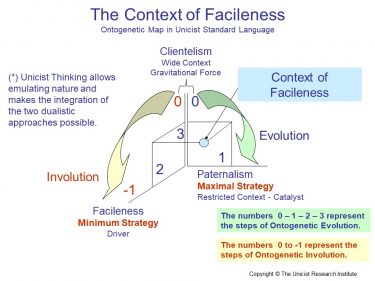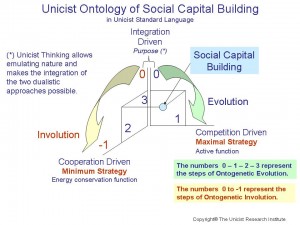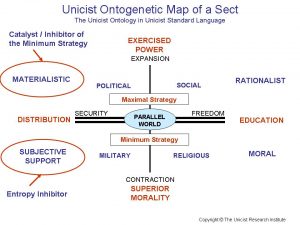The Power of Nations is now based on the construction capacity which is given by work and sustained by the non-exerted destruction capacity that we call dissuasion power. This trend also applies to any institution that intends to influence the environment or the market. This is a new trend that requires a new perspective where the value added to the environment and its consistency defines the influential power and the dissuasion power is the core of the defensive strategy.
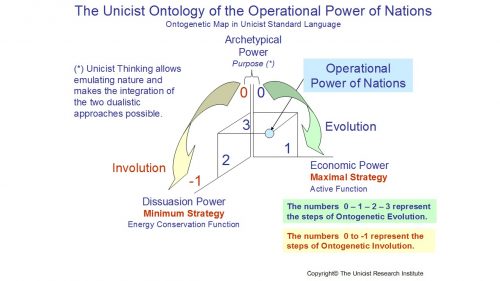
The legitimacy of military expansion became illegitimate in the world. A new power became evident: Work. Work became the power of a nation and technology its catalyst. Military became the necessary dissuasion power to defend the power of Work.
This implies that the economic power has to provide the maximal strategy, the possibility of upgrading to the next step while the dissuasion power developed by the administrative authorities of the country provides the necessary secure environment to grow.
It has to be considered that the economic power is basically individualistic oriented. In the materialistic world the same “thing” cannot be shared. Money is in my pocket or it is in your pocket. It cannot be in both at the same time.
That is why the nature of the materialistic world is the dualism which naturally drives towards fostering activities based on individual initiatives.
This is not necessary at a subsistence level but it is a must if a culture fosters expansion and influence in the environment.
Materialistic activities are naturally driven by individual responsibility. This means that the institutions that develop materialistic activities need to understand and manage the individual needs of their members in order to be successful.
The economic power of a country is strongly influenced by the individual value of work of the culture. Individuals expand the power of a Nation when it is implicit in the archetype.
When it is not the case, the power of a Nation diminishes.
The Power of Country Archetypes is defined by Work
P=W/t
Work implies the capacity of displacing facts in nature in order to generate a usable added value for a society.
Therefore it is implicit that the fundamentals of work are consistent with the different levels of archetypes. We will describe in the following the fundamentals of work in the different archetypes:
1) Social Value of Influential Work
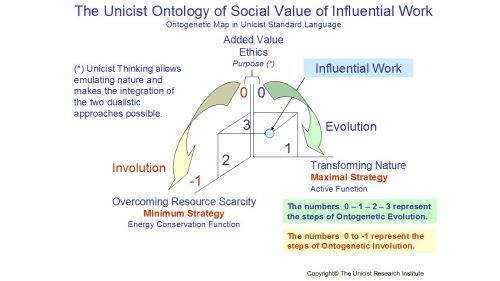 The purpose of work in elites of influential archetypes is to generate added value in their societies. To do so their active function is driven by the transforming of nature and the energy conservation function is the need to overcome resource scarcity.
The purpose of work in elites of influential archetypes is to generate added value in their societies. To do so their active function is driven by the transforming of nature and the energy conservation function is the need to overcome resource scarcity.
If we see it at an operational level we can define that:
The maximal strategy of the elites is to transform nature driven by the energy focused on knowledge and the personal need that sustains their actions is the self-affirmation of their deeds.
The minimum strategy to overcome resource scarcity is driven by the energy of their capacity to produce and the personal need that sustains their actions is the capacity to manage the time to make things happen.
2) Social Value of Expansive Work
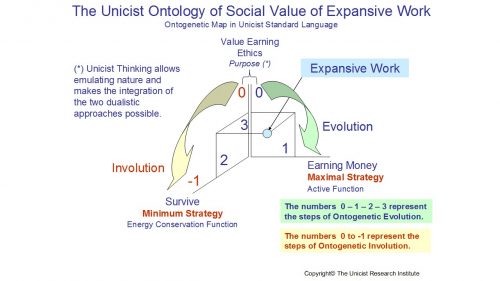 The purpose of work in elites of expansive archetypes is to earn value in their societies. To do so their active function is driven by earning money and the energy conservation function is the need to survive.
The purpose of work in elites of expansive archetypes is to earn value in their societies. To do so their active function is driven by earning money and the energy conservation function is the need to survive.
If we see it at an operational level we can define that:
The maximal strategy of the elites is to earn money driven by the energy focused on their efforts to do so and the personal needs for recognition sustain their actions.
The expansive work driven segments are conservatives that use work “for a living”. Their drivers are the benefits they receive as a counterpart for work.
They influence the subsistent and survival driven segments. Value adding is their utopia.
The minimum strategy is to ensure subsistence, which is driven by the energy of their capacity to collect from the environment and the personal need that sustains their action is the need to “have” things.
3) Social Value of Subsistent Work
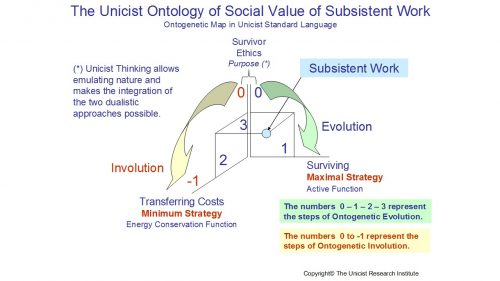 The purpose of work in elites of surviving archetypes is to follow the rules of survivors’ ethics. To do so their active function is driven by survival actions and the energy conservation function is the need to transfer costs.
The purpose of work in elites of surviving archetypes is to follow the rules of survivors’ ethics. To do so their active function is driven by survival actions and the energy conservation function is the need to transfer costs.
If we see it at an operational level we can define that:
The maximal strategy of the elite is to survive driven by the energy focused on collecting and the personal need “to have” of the elite sustains their actions.
The minimum strategy of the elites that belong to this segment is to transfer costs to the environment and is driven by the energy focused on minimizing efforts.
This minimum strategy is sustained by the personal needs to fulfill their basic needs.
Subsistent work segments are driven by over-adaptive behaviors that make them do what is necessary to obtain the materialistic benefits to survive. They expect to be “adopted” by the environment and judged by their intentions.
4) Social Value of Survivors Work
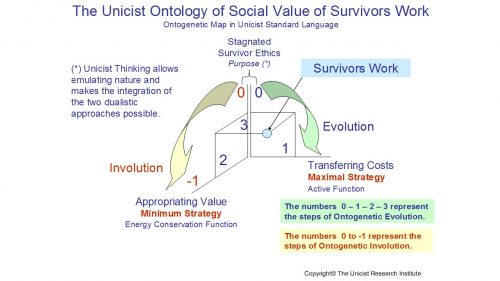 The purpose of work in surviving archetypes is to gain, based on the necessary justifications exerting all the necessary power to obtain the benefit. This is the ethics of stagnated survivors. To do so the active function that drives their survival is the transfer of costs and the energy conservation function is the value appropriation.
The purpose of work in surviving archetypes is to gain, based on the necessary justifications exerting all the necessary power to obtain the benefit. This is the ethics of stagnated survivors. To do so the active function that drives their survival is the transfer of costs and the energy conservation function is the value appropriation.
If we see it at an operational level, we can define that:
The maximal strategy of the elites is to transfer costs driven by the energy focused on minimizing the efforts and the personal satisfaction of the basic needs sustains their actions.
The minimum strategy is to appropriate value from the environment that is driven by the necessary justifications and sustained by the personal exertion of power.
Conclusion
Understanding that the power of a Nation depends on its capacity to work is something very difficult to accept because it is rather new.
And accepting that the archetype of a culture defines the level of work that is the standard in an environment sounds deterministic and for some people racist. Because it implies that every culture obtains what it produces; that underdevelopment is defined by the underdeveloped, development by the developed and emergent by the emerging.
Power = W/t: Power can be measured in speed
Power can be measured in speed. That is why we say we can make a metaphor and measure the level of development in speed.
If developed culture move at a speed of 100 km/hour, underdeveloped evolve more slowly.
That is why the gap between development and underdevelopment increases from day to day.
But emergent cultures are emergent because they move faster than the developed ones, which means that the gap between emergent cultures and developed cultures decreases from day to day, until the emergent cultures surpass the developed cultures
(*) An excerpt from the book “Unicist Conceptual Economy” by Peter Belohlavek
Unicist Future Research Lab
NOTE: The Unicist Research Institute was the pioneer in using the unicist logical approach in complexity science research and became a private global decentralized leading research organization in the field of human adaptive systems. It has an academic arm and a business arm.






